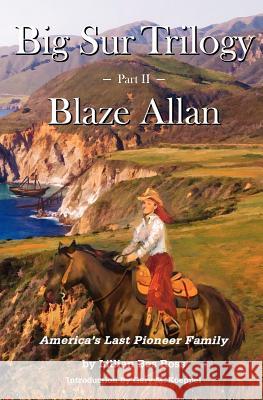Big Sur Trilogy: Part II Blaze Allan: America's Last Pioneer Family » książka
Big Sur Trilogy: Part II Blaze Allan: America's Last Pioneer Family
ISBN-13: 9781938924019 / Angielski / Miękka / 2012 / 300 str.
The Big Sur Trilogy is the story about one of the last pioneer families in America who lived freely and self-sufficiently in a remote area of the central California known as Big Sur. The Trilogy spans over 100 years and depicts the hard but rewarding life of three generations of the Zande Allan family. The Big Sur Coast extends 100 miles from Carmel to San Simeon and is bordered by the Santa Lucia Mountains and Pacific Ocean. This remote wilderness contains some of the most rugged terrain in the American continent. From the beginning of time the south coast was accessible only by foot, mule or horseback. Although inhabited by three nomadic American Indian tribes, the Spaniards refused to travel along the coast because of the high mountains, steep canyons and dangerous water crossings. In the 1870s a partial wagon road was built from Mal Paso Crossing to Bixby Creek Ranch. The next 74 miles of the Big Sur Coast was not accessible by auto until 1937 with the opening of Highway One, which took eighteen years to build, mostly by convict labor using dynamite and steam shovels. When completed, it became the only road in the United States that went directly from a horse trail to an auto road, thus bypassing the traditional, interim wagon road. The road changed forever the lives of the Big Sur homesteaders as the mainstream modern American culture motored into their once-private coast. Before the road, few 'outlanders' visited the south coast because travel was strenuous, the trail precarious and the homesteads were few and far between, but those who ventured there were greeted with coast hospitality, lively conversation and ranch grown food. The Big Sur pioneer families worked long hours and full days with little time for frills or fancy things, and they had no patience for what was not plain spoken. A trip to Monterey to buy supplies or to Salinas to sell cattle took three hard days by horseback along narrow trails at the edge of granite cliffs often falling straight to the sea some 2000 feet below. Twice a year the ranchers would gather for a coast barbecue with neighbors on the beach while waiting for the cargo schooner to arrive and winch ashore their load of hard stock supplies too bulky for pack mule or horse. The second novel is named after Zande and Hannah's daughter Blaze Allan who took her headstrong ways from her father and her tender feelings from her mother. She was a beautiful young woman who could sit a saddle as good as any man on the coast. When her father demanded that she marry Joe Williams, whom she detested and rejected. One day she met a stranger on the trail and began to dream about him. A neighbor, Pete Garcia, teased Blaze into hunting Abalone on a remote beach, but once there, his interest quickly changed from Abalone to Amore. As a proper coast girl, reputation meant everything, and she rejected his advances. As the tide came in they were trapped in the cove and such an overnight stay was forbidden. Pete knew that folks would assume the worst and ruin her reputation so he decided to swim for help. Blaze tried to stop him but he drowned in the powerful surf. Pete's parents and even her own suspected she was now a ruined woman and blamed her for Pete's death. Joe Williams, her rejected suitor, spread the rumor that he had also been with Blaze. Devastated that her reputation was shattered simply by rumor, she fled Pete's funeral and rode to Monterey but, once again, she came upon the stranger, who arranged for her safe passage on his tanbark cargo schooner. In Monterey, alone and hungry, she struggled to survive by working for food and shelter, but the town folks suspected she was a fallen woman who had been cast from the coast by her kinfolks. After a shopkeeper tried to take advantage of her youth and beauty, she bolted from Monterey and headed back to the Coast on foot where, once more, the handsome man of her dreams appeared on the trail and rescued her from herself.











